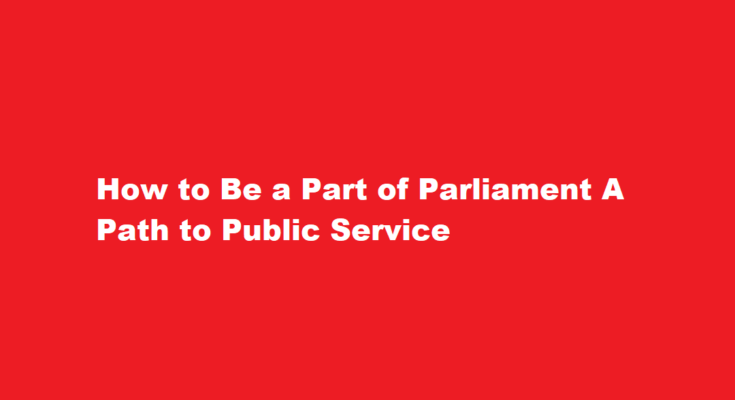Introduction
The Parliament plays a crucial role in shaping the destiny of a nation, making decisions that affect millions of lives. Being a part of this esteemed institution is a noble aspiration that many individuals harbor. In this article, we will explore the path to becoming a member of parliament, shedding light on the qualifications, process, and responsibilities involved in this unique and influential position.
Understand the Role of Parliament
Before embarking on the journey to become a parliamentarian, it is essential to have a profound understanding of what this role entails. Parliament serves as the legislative body responsible for enacting laws, scrutinizing government actions, and representing the interests of the public. Recognizing the significance of this role will be the foundation of your commitment to public service.
Education and Eligibility
To be eligible to be a parliamentary candidate, one must be a citizen of the country, meet the minimum age requirement (which varies by country), and in some cases, hold no criminal record. A good educational background can also enhance your credibility. Many successful parliamentarians have degrees in law, political science, or related fields, although it’s not mandatory.
Join a Political Party
In most democratic countries, parliamentary candidates are affiliated with political parties. Joining a party can provide you with a platform to build your political career. Be prepared to invest time in party activities, build a network, and align with the party’s ideology and goals.
Grassroots Involvement
To gain the trust of your party and the public, start your political journey at the grassroots level. Volunteer for campaigns, participate in community service, and engage in local issues. This involvement not only showcases your commitment but also helps you understand the needs and concerns of your potential constituents.
Networking and Building Relationships
Networking is an integral part of politics. Attend political gatherings, public meetings, and interact with current parliamentarians and leaders in your party. Building strong relationships can open doors to opportunities and endorsements.
Develop a Platform and Vision
Articulate a clear vision for your constituency and the country. Understand the issues that matter most to your potential constituents and develop a comprehensive platform that addresses these concerns. Be prepared to present your ideas convincingly to gain support.
Run for Office
When the time is right, express your interest in running for parliament within your party. This often involves seeking the nomination to represent your party in a specific constituency. Competing in primaries or party conventions is a common way to secure this nomination.
Campaigning
Campaigning is a crucial phase of the journey. It involves connecting with the public, addressing their concerns, and convincing them that you are the best candidate. Use various methods such as public rallies, debates, social media, and door-to-door canvassing to reach potential voters.
Fundraising
Campaigns can be expensive, so effective fundraising is essential. Seek financial support from donors who share your values and believe in your vision. Be transparent about your financial transactions to maintain credibility.
Stay Informed and Engaged
Throughout your political career, stay well-informed about current events, policy issues, and the concerns of your constituents. Engage in debates, participate in parliamentary committees, and contribute to the legislative process.
Win the Election
If you succeed in winning the majority of votes in your constituency, you’ll become a member of parliament. Celebrate your victory, but remember that the real work begins once you take office.
Fulfill Your Responsibilities
As a parliamentarian, your primary responsibility is to represent your constituents and advocate for their interests. This includes attending parliamentary sessions, participating in debates, and voting on legislation. Additionally, you’ll need to address the concerns of your constituents and work towards their betterment.
Frequently Asked Questions
What should I do to become a member of Parliament?
In order to be chosen a member of Parliament, a person must be a citizen of India and not less than 30 years of age in the case of Rajya Sabha and not less than 25 years of age in the case of Lok Sabha. Additional qualifications may be prescribed by Parliament by law.
How many types of members are there in Parliament?
The Parliament has a sanctioned strength of 543 in the Lok Sabha and 245 in the Rajya Sabha including 12 nominees from the expertise of different fields of literature, art, science, and social service.
Conclusion
Becoming a part of the parliament is a challenging but rewarding journey. It demands dedication, hard work, and a genuine commitment to public service. By understanding the role, building a strong foundation, and staying true to your principles, you can contribute to the betterment of your country and make a lasting impact on society. Remember, the path to parliament is not just about acquiring power; it’s about using that power to serve the people and uphold the values of democracy.
Read Also : Journey to Becoming a K-pop Idol A Pathway from India



